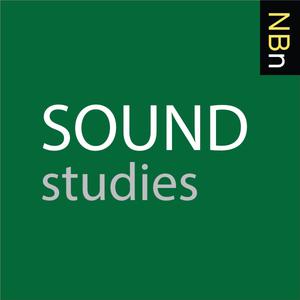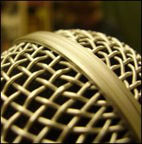
New Books in Sound Studies
Interviews with scholars of sound about their new books.
- 1 hour 21 minutesListening in the Afterlife of Data
If you walk into David Cecchetto‘s classroom, you might find people wearing audio devices that simulate hearing with a thousand-foot wide head. Or gadgets that swap their ears so that the left ear hears what the right should and vice versa. David is a media theorist who draws on his background as an artist/musician, to create what he calls “engagements,” strange sonic experiments that help him—and his students—understand the nature of our computer-driven lives.
In this episode, we feature an extended chat with David about his recent book, Listening in the Afterlife of Data (Duke University Press). It’s a book about the eternal impossibility of communication and the texture of that impossibility in our current computer-mediated age. David says we live in the afterlife of data, by which he means we know that our data-driven representations of the world don’t really capture the reality of our inner or outer lives, and we know that algorithms perpetuate injustices of all sorts—and yet, we still live our lives as if we do believe in the data. And this is where his engagements come in, the sonic experiments that confront the distortions and fallacies and textures of a data-driven life.
David Cecchetto is Professor of Critical Digital Theory in the Department of Humanities at York University in Toronto, Director of the Graduate Program in Social and Political Thought, he’s President of the Society for Literature, Science, and the Arts. He wrote the book Humanesis: Sound and Technological Posthumanism (2013) and he’s co-authored and edited several others.
Learn more about your ad choices. Visit megaphone.fm/adchoices
Support our show by becoming a premium member! https://newbooksnetwork.supportingcast.fm/sound-studies
20 January 2025, 9:00 am - 56 minutes 49 seconds(Re)Making Radio with the Shortwave Collective
The Shortwave Collective describe themselves as “an international feminist group using the radio spectrum as artistic material.” I was first intrigued by their piece Receive-Transmit-Receive, an exquisite corpse of audio, in which members each contributed their own recordings of sounds from across the radio spectrum. But what really affected me was their ongoing public education project of teaching people to make their own no-power, low-budget radios called open-wave receivers. They’ve held radio-making workshops in Portugal, France, and the UK and they’ve published a how-to in Make magazine.
I wanted to talk to the Shortwave Collective because they are presenting a radically different vision of what radio is and can be. Radio’s history can be thought of as an extended expression of military, political, commercial, and cultural dominance. But the Collective embraces play, experimentation, failure, community, and open listening in their feminist radio practice. So, let’s talk to the Shortwave Collective and see if we can rethink radio–what it’s for and what it can do.
And in the second half of the show, we’ll hear an audio documentary in which the Shortwave Collective teaches you how to make your own open-wave receiver.
Special thanks for appearing on the show to Shortwave Collective members Lisa Hall, Alyssa Moxley, Georgia Muenster, and Maria Papadomanolaki. The other Collective members are Sally A. Applin, Kate Donovan, Brigitte Hart, and Hannah Kemp-Welch.
Today’s show was written and edited by Mack Hagood with technical assistance from Craig Eley. Today’s music is by Graeme Gibson with additional sound design elements by Cris Cheek and Shortwave Collective. Phantom Power’s production team includes Craig Eley, Ravi Krishnaswami, and Amy Skjerseth. Our Production Coordinator and transcriber is Jason Meggyesy.
Learn more about your ad choices. Visit megaphone.fm/adchoices
Support our show by becoming a premium member! https://newbooksnetwork.supportingcast.fm/sound-studies
13 January 2025, 9:00 am - 55 minutes 17 secondsRebecca Charbonneau, "Mixed Signals: Alien Communication Across the Iron Curtain" (Polity, 2024)
In the shadow of the Cold War, whispers from the cosmos fueled an unlikely alliance between the US and USSR. The search for extraterrestrial intelligence (or SETI) emerged as a foundational field of radio astronomy characterized by an unusual level of international collaboration—but SETI’s use of signals intelligence technology also served military and governmental purposes.
In this captivating new history of the collaboration between American and Soviet radio astronomers as they sought to detect evidence of extraterrestrial civilizations, historian Dr. Rebecca Charbonneau reveals the triumphs and challenges they faced amidst a hostile political atmosphere. Shedding light on the untold stories from the Soviet side for the first time, she expertly unravels the complex web of military and political interests entangling radio astronomy and the search for alien intelligence, offering a thought-provoking perspective on the evolving relationship between science and power.
Mixed Signals: Alien Communication Across the Iron Curtain (Polity, 2024) is not just a story of radio waves and telescopes; it's a revelation of how scientists on both sides of the Iron Curtain navigated the complexities of the Cold War, blurring the lines between espionage and the quest for cosmic community. Filled with tension, contradiction, and the enduring human desire for connection, this is a history that transcends national boundaries and reaches out to the cosmic unknown, ultimately asking: how can we communicate with extraterrestrials when we struggle to communicate amongst ourselves?
This interview was conducted by Dr. Miranda Melcher whose new book focuses on post-conflict military integration, understanding treaty negotiation and implementation in civil war contexts, with qualitative analysis of the Angolan and Mozambican civil wars.
Learn more about your ad choices. Visit megaphone.fm/adchoices
Support our show by becoming a premium member! https://newbooksnetwork.supportingcast.fm/sound-studies
8 January 2025, 9:00 am - 46 minutes 50 secondsIn One Ear, Out The Other
On today’s show, we address a performer’s nightmare—the nightmare of not being able to hear yourself onstage. My guest is ethnomusicologist Jacob Danson Faraday, who takes us behind the scenes of the famed Cirque du Soleil to learn how even Cirque’s world-class musicians struggle with technology when they want to hear themselves.
Building on his international career as a touring sound technician, ethnomusicologist Jacob Danson Faraday researches the working communities and hidden labor of live sound technicians on large-scale touring productions. He is a recent graduate of the PhD program in ethnomusicology at Memorial University of Newfoundland. Today Jake takes us behind the scenes of Cirque du Soleil, sharing his dissertation research on how sound engineers and musicians negotiate the power to hear oneself.
Stage monitoring, the technology that allows musicians to hear the performance as they play, is a topic we rarely hear about, but it’s absolutely essential to performers. Faraday suggests that, while new in-ear monitors are marketed as a godsend for performers, they are more of a mixed blessing, “homogenizing listening” and creating new kinds of issues and anxieties for musicians.
Today’s show was edited and mixed by Jacob Danson Faraday, with additional editing by Mack Hagood.
The song “Sail Away” by Colton Benjamin (2017) was obtained from the Free Multitrack Download Library on the Cambridge Music Technology website by Mike Senior, author of the excellent book Mixing Secrets For The Small Studio.
Read the dissertation: Buried in the mix: touring sound technicians, sonic control, and emotional labour on Cirque du Soleil’s Corteo by Jacob Danson Faraday (2021).
Learn more about your ad choices. Visit megaphone.fm/adchoices
Support our show by becoming a premium member! https://newbooksnetwork.supportingcast.fm/sound-studies
6 January 2025, 9:00 am - 1 hour 20 minutesFela Kuti and the Black Atlantic
This summer, sound artist and “guerrilla academic” Ben Coleman got in touch to say how much he enjoys Phantom Power. He also suggested we check out another podcast he’s into called Love is the Message.
We’re glad we did! Love is the Message: Music, Dance & Counterculture is a fantastic show from Tim Lawrence and Jeremy Gilbert, both of them authors, academics, DJs and audiophile dance party organisers. I recognized Tim Lawrence’s name from his great book on Arthur Russell. Jeremy Gilbert is Professor of Cultural and Political Theory at the University of East London and a prolific author. Tim and Jeremy have been longtime collaborators and when the clubs closed and universities cut faculty hours due to covid, they started podcasting.
The way I’d describe their show is, imagine the amazing college class you never got to take where you learn about the intersections of global dance music and radical politics, from the 1960s to today. They do shows on disco, Motown, reggae, tropicalia, funk, you name it with a strong cultural studies perspective. And I think the episode we’re going to hear today is a perfect example of their approach—it’s ostensibly an episode about Fela Kuti, but it’s also terrific seminar on the Black Atlantic and the political history of Nigeria.
So thanks, Ben, for the recommendation. Thanks, Tim and Jem for sharing the pod with me and doing this episode swap. And thanks everyone for listening. Talk next month!
Learn more about your ad choices. Visit megaphone.fm/adchoices
Support our show by becoming a premium member! https://newbooksnetwork.supportingcast.fm/sound-studies
30 December 2024, 9:00 am - 54 minutes 43 secondsAwfully Viral
It’s summer and we are busy working on episodes for our fourth season. We’ve also rebuilt our website–check out the the fabulous new phantompod.org. There’s other great stuff in store for the podcast, so stay tuned!
But today, I want to share one of my favorite podcasts with you: Will Robin’s Sound Expertise. For those of you into musicology or popular music studies, there’s a great chance you’re already a subscribe. That’s because Will’s show is fantastic and I personally know many music scholars who are devoted fans of this show that features conversations with established and up-and-coming music scholars. For those of you who aren’t familiar with Dr. Robin, you might remember that I quoted his New York Times obituary of R. Murray Schafer in our first episode on Schafer. He has written about music for the Times for at least a decade. He’s also an assistant professor of Musicology at the University of Maryland and the author of the book Industry: Bang on a Can and New Music. Sound Expertise will be dropping its third season in the fall.
The episode you are about to hear is one that I love as a media scholar. Will Robin interviews Dr. Paula Harper about her work on viral music videos and taste, specifically that terrible Rebecca Black video “Friday” that’s probably still rattling around in some dark recess of your brain. Dr. Harper digs into the awful virality of that video and all of its cover versions, discerning what this case study can tell us about genre, gender, and how and why sound travels on the internet. It’s a great discussion and I hope you enjoy it. And by the way, since this interview happened, Paula Harper has joined the faculty of the University of Chicago as an assistant professor of music. So, who says YouTube rots your brain?
Learn more about your ad choices. Visit megaphone.fm/adchoices
Support our show by becoming a premium member! https://newbooksnetwork.supportingcast.fm/sound-studies
23 December 2024, 9:00 am - 43 minutes 3 secondsVoices Part 3: Dork-O-Phonics
Jonathan Sterne is one of the most influential scholars working on sound and listening. His 2003 book, The Audible Past: Cultural Origins of Sound Reproduction, had a formative influence on the then-nascent field of sound studies. His 2012 book, MP3: The Meaning of a Format, was both a fascinating cultural history and a deep meditation on the purpose of compression technology in capitalism. Today, Sterne talks to Phantom Power about his new book, Diminished Faculties: A Political Phenomenology of Impairment (Duke UP 2022). Specifically, he tells the story of the “Dork-o-phone,” a vocal amplifier he wears to give talks or communicate in loud spaces. Jonathan explains why he wears the Dork-o-phone, what it’s taught him about voice, technology, and disability, and how his experience informs Diminished Faculties’ “phenomenology of impairment.”
This is the third and final part of our series, Voices. Although you don’t need to listen to the other episodes first to enjoy this one, here are the links to part one and part two.
All of this episode’s sound art and music are performed by Jonathan Sterne and/or groups he appears in:
- Cancerscapes: Recordings made during Sterne’s thyroid cancer treatment
- Volte: An instrumental post rock band
- The Buddha Curtain: solo electronic music
Jonathan Sterne is Professor and James McGill Chair in Culture and Technology at McGill University. He does research in sound studies; media theory and historiography; science and technology studies; new media; disability studies; music; and cultural studies.
You can read Jonathan Sterne’s cancer diaries at https://www.cancerscapes.ca.
Learn more about your ad choices. Visit megaphone.fm/adchoices
Support our show by becoming a premium member! https://newbooksnetwork.supportingcast.fm/sound-studies
16 December 2024, 9:00 am - 54 minutes 49 secondsVoices Part 2: The Sound of My Voice
In part two of our three-part series “Voices,” we feature an exciting new voice in the world of sound studies, Stacey Copeland.
In part one last month, we examined the role voices play in professional sports and unpacked some of the understandings of ability and masculinity that inform the sound of the quarterback’s voice in the NFL. Copeland’s audio documentary, “This is the Sound of My Voice,” examines another group of professionals—women broadcasters and podcasters, who struggle with sonic sexism from male colleagues, audiences, and sometimes, even themselves.
The documentary was originally presented on radio in three parts, but Stacey graciously edited a shorter version for this episode of Phantom Power.
Stacey Copeland is a media producer and Joseph-Armand Bombardier (CGS) Ph.D. candidate at Simon Fraser University’s School of Communication in Vancouver, Canada. She received her Master of Arts from the Ryerson York joint Communication and Culture graduate program where she studied with a focus on radio production, sound studies, media culture and gender studies. She completed her Bachelor of Arts in Radio and Television Arts from Ryerson University with a minor in English and a specialization in audio production for radio, music and film. It was during her Master’s work that Copeland co-founded FemRadio, a Toronto, Canada based feminist community radio collective. Currently, she is the supervising producer at Amplify Podcast Network, a collaborative project dedicated to reimagining the sound of scholarship.
Learn more about your ad choices. Visit megaphone.fm/adchoices
Support our show by becoming a premium member! https://newbooksnetwork.supportingcast.fm/sound-studies
9 December 2024, 9:00 am - 31 minutes 27 secondsVoices Part 1: Hut-Hut-Hike
In this first episode of a three-part series called Voices, we’re listening to the sound of American football—specifically the role of voices in the NFL. We start with a rather quirky story from NFL history that speaks to how the voice intersects with our ideologies around both disability and gender. It’s about a player whose voice stopped working the way it once did, revealing that football isn’t just a competition between teams on the gridiron—it’s a competition of audibility and vocal toughness. And like the rest of our Voices series, it opens up fascinating questions about what a voice actually is, what it does, and what it means, to us and to those around us.
Our guest is Travis Vogan, a prolific sports media scholar at the University of Iowa. Vogan has written books on ABC Sports, ESPN, boxing movies, and those “voice of God” NFL Films. We also hear briefly from sound scholar Jonathan Sterne, who will feature prominently in an upcoming episode of this Voices series.
Some of this episode is based on the article “The 12th Man: Fan Noise in the Contemporary NFL,” published in Popular Communication by Mack Hagood and Travis Vogan in 2016. If you don’t have institutional access, you can also find the PDF here.
Other things heard or mentioned in this episode:
“The Wild Story of the 49ers, Steve DeBerg, and a Shoulder-Pad Speaker System,” by Eric Branch, San Francisco Chronicle, September 29, 2020.
“The UNBELIEVABLE Story of Steve DeBerg’s Loudspeaker Shoulder Pads,” by the Pick Six Podcast.
Learn more about your ad choices. Visit megaphone.fm/adchoices
Support our show by becoming a premium member! https://newbooksnetwork.supportingcast.fm/sound-studies
2 December 2024, 9:00 am - 1 hour 4 minutesHow Our Sonic Sausage Gets Made
This episode, we take you behind the scenes of Phantom Power. Producer/host Mack Hagood was invited by Dario Llinares and Lori Beckstead to be a guest on their show, The Podcast Studies Podcast. As you may or may not know, there are a lot of academics out there not only making podcast themselves but also studying podcasts and podcasting as a genre and an industry–and Dario and Lori are in that camp. Their podcast is a tremendous resource for those who want to understand this emerging academic field.
In the interview, Dario prompted Mack to go pretty deep into the production of Phantom Power, exploring the techniques and philosophy behind the show, as well as the potential Mack sees for podcasting as a format for generating scholarly knowledge. And after the interview, Lori had some intriguing comments about what counts as “original scholarship” when we do it in sound. So, as we prepare our 2022 season of Phantom Power, we thought we’d share this discussion of how our sonic sausage gets made. And we’ll be back next month with a new original episode!
Things we talk about in this episode:
Hush: Media and Sonic Self-Control by Mack Hagood (Duke, 2019)
“Emotional Rescue” by Mack Hagood (Real Life, December 3, 2020)
“The Scholarly Podcast: Form and Function in Audio Academia” by Mack Hagood in Saving New Sounds: Podcast Preservation and Historiography, Jeremy Wade Morris and Eric Hoyt, Eds (University of Michigan Press, 2021).
Learn more about your ad choices. Visit megaphone.fm/adchoices
Support our show by becoming a premium member! https://newbooksnetwork.supportingcast.fm/sound-studies
25 November 2024, 9:00 am - 35 minutes 3 secondsFiona Smyth, "Pistols in St Paul's: Science, Music, and Architecture in the Twentieth Century" (Manchester UP, 2024)
On a winter's night in 1951, shortly after Evensong, the interior of St Paul's Cathedral echoed with gunfire. This was no act of violence but a scientific demonstration of new techniques in acoustic measurement. It aimed to address a surprising question: could a building be a musical instrument?
Pistols in St Paul's: Science, Music, and Architecture in the Twentieth Century (Manchester University Press, 2024) by Dr. Fiona Smyth tells the fascinating story of the scientists, architects and musicians who set out to answer this question. Beginning at the turn of the century, their innovative experiments, which took place at sites ranging from Herbert Baker's Assembly Chamber in Delhi to Abbey Road Studios and a disused munitions factory near Perivale, would come to define the field of 'architectural acoustics'. They culminated in 1951 with the opening of the Royal Festival Hall - the first building to be designed for musical tone.
Deeply researched and richly illustrated, Pistols in St Paul's brings to light a scientific quest spanning half a century, one that demonstrates the power of international cooperation in the darkest of times.
This interview was conducted by Dr. Miranda Melcher whose new book focuses on post-conflict military integration, understanding treaty negotiation and implementation in civil war contexts, with qualitative analysis of the Angolan and Mozambican civil wars.
Learn more about your ad choices. Visit megaphone.fm/adchoices
Support our show by becoming a premium member! https://newbooksnetwork.supportingcast.fm/sound-studies
22 November 2024, 9:00 am - More Episodes? Get the App
Your feedback is valuable to us. Should you encounter any bugs, glitches, lack of functionality or other problems, please email us on [email protected] or join Moon.FM Telegram Group where you can talk directly to the dev team who are happy to answer any queries.
 New Books in Secularism
New Books in Secularism
 Phantom Power
Phantom Power
 New Books in Music
New Books in Music
 New Books in Film
New Books in Film
 New Books in Popular Culture
New Books in Popular Culture
 Sounding Out!
Sounding Out!